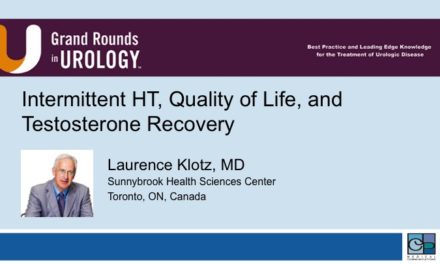Matthew R. Cooperberg, MD, MPH, presented “Forward Progress in Molecular Markers in Prostate Cancer” during the 32nd Annual International Prostate Cancer Update (IPCU32) conference on March 8, 2022, in Snowbird, Utah.
How to cite: Cooperberg, Matthew R. “Forward Progress in Molecular Markers in Prostate Cancer.” December 9, 2021. Accessed Jul 2025. https://grandroundsinurology.com/forward-progress-in-molecular-markers-in-prostate-cancer/
Forward Progress in Molecular Markers in Prostate Cancer – Summary
Matthew R. Cooperberg, MD, MPH, Professor of Urology and Epidemiology & Biostatistics and Helen Diller Family Chair in Urology at the University of California, San Francisco, details developments in a range of molecular markers used for diagnosis of prostate cancer, as well as how they are used for risk stratification and treatment post-diagnosis. He first explains how PSA has become widespread in PCa diagnosis but can result in over-treatment of low risk prostate cancer, and under-treatment of high-risk prostate cancer, Dr. Cooperberg notes that there are six markers that can be tested before an initial biopsy, asserting that these should be considered in a multivariable framework when assessing an individual’s risk for prostate cancer. He cites a study that illustrates when PCA3 was studied with two thresholds—a low threshold, below which it has a very accurate negative predictive value (NPV); and a high threshold, above which it has a very accurate positive predictive value (PPV). He next turns to 4K and phi, citing another study and calling them similar in performance. Dr. Cooperberg then describes MyProstateScore, ExoDX, and SelectMDx before posing a question about how these are used vs. magnetic resonance imaging (MRI). Further, Dr. Cooperberg points out that mpMRI is heavily dependent on radiologist skill and calls the resulting variation “unacceptable,” with Prostate Imaging Reporting and Data System (PI-RADS) PPV (for GG ≥2) results being too inconsistent. He then addresses diagnostic sequences, highlighting one that looks at PSA (encouraging very low threshold PSA referrals), then uses a biomarker test, then an MRI (for the purposes of guiding the biopsy), then a biopsy. Dr. Cooperberg’s next focuses on the post-diagnosis stage; starting with the San Francisco Consensus Statement #2, explaining that, to be clinically useful, a putative biomarker must be shown to improve on an existing, validated, multivariable model reflecting all available clinical information rather than on a single variable or nonlinear risk grouping. He also states that further inexpensive tissue tests can result in even greater accuracy. He addresses the value in adding genomic prostate score (GPS) to CAPRA and displays data from a systematic review of the Decipher genomic classifier, explaining that for every endpoint, it works. Dr. Cooperberg addresses the question of whether biomarkers improve decision making for active surveillance (AS) vs. treatment, citing a study and concluding that this is currently unclear. Dr. Cooperberg concludes with the following points: markers improve prognostic accuracy over multivariable risk stratification tools; which patients benefit from markers at diagnosis remains a bit unclear; a future role for markers should be helping tailor intensity of AS rather than simply selecting men for AS vs. treatment; there is a need for predictive, rather than just prognostic, tests; and there is a need for further prospective trials.
About the 32nd Annual International Prostate Cancer Update (IPCU32):
Presented by Program Chair E. David Crawford, MD, The International Prostate Cancer Update (IPCU), is a multi-day, CME-accredited conference focused on new developments in prostate cancer treatment, diagnosis, and prevention. IPCU 32 featured lectures, interactive discussions, panel roundtables, debates, and case reports. This conference was led by expert physicians and is designed for urologists, medical oncologists, radiation oncologists, and other healthcare professionals involved in the diagnosis and treatment of prostate cancer.
ABOUT THE AUTHOR
Matthew R. Cooperberg, MD, MPH, is Professor of Urology and Epidemiology & Biostatistics and Helen Diller Family Chair in Urology at the University of California, San Francisco. He earned an undergraduate degree in English from Dartmouth College in Hanover, New Hampshire, before pursuing his MD from the Yale School of Medicine in New Haven, Connecticut. Dr. Cooperberg also earned an MPH with a concentration in Health Policy from the Yale School of Epidemiology and Public Health. He joined the faculty at UCSF in 2009, and was named a professor there in 2018.
Dr. Cooperberg’s clinical interests include the diagnosis and management of genitourinary malignancies, as well as minimally-invasive techniques to treat benign and malignant diseases. His research focus is prostate cancer, and in this area he is particularly interested in health services, risk assessment and biomarkers, comparative effectiveness of treatments, and decision support and survivorship. He is also interested in care disparities and in looking at prostate cancer as an international disease.
Dr. Cooperberg has written over 400 peer-reviewed scientific articles and is an investigator on several ongoing federal grants. He has won the Young Investigator Award from the Prostate Cancer Foundation and the American Urological Association Gold Cystoscope Award, and was also named Young Urologist of the Year in 2015. He is a Fellow of the American College of Surgeons and a member of the American Urological Association and the Society for Urologic Oncology.




